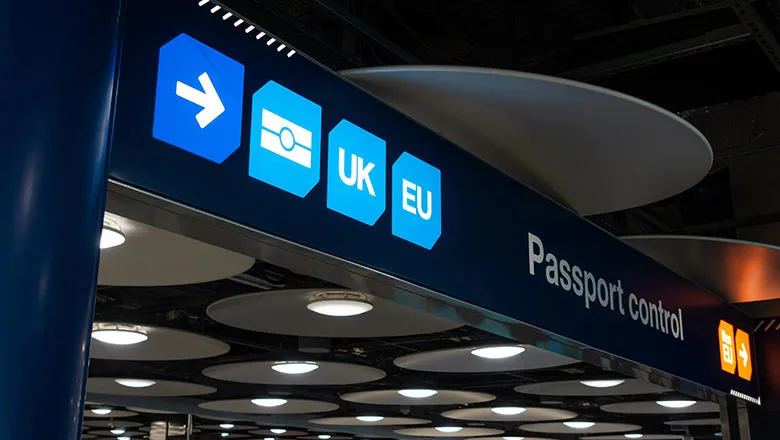20 November 2019
Could automated immigration enforcement create “the new Windrush” for EU nationals?
Swee Leng Harris
SWEE LENG HARRIS: The government could enforce the “hostile environment” via data sharing between HMRC and the Home Office to target EU citizens without settled status.

Through the EU settlement scheme, the UK government could use digital systems for automatic targeting and criminalisation of European Economic Area (EEA) nationals working and living in the UK.
EU settlement scheme
The UK established the EU settlement scheme for EEA nationals and their families to apply for immigration status in light of Brexit. If an EEA national has been living in the UK for five or more years they are entitled to settled status — a type of indefinite leave to remain. If they have been in the UK for less than five years they are entitled to pre-settled status — a type of limited leave to remain. The application process is digital-by-default and includes automatic checks of data held by the HMRC and the Department for Work and Pensions (DWP) to verify how long an applicant has lived in the UK. If the UK leaves the EU with a Withdrawal Agreement ratified, then the settled status application deadline is 30 June 2021, or 31 December 2020 if the UK leaves without an Agreement.
The “hostile environment” and data sharing
The “hostile environment” refers to a set of measures in immigration law, as explained by the then Home Secretary Theresa May in 2012: “The aim is to create here in Britain a really hostile environment for illegal migration”, although the government now calls the same policy the “compliant environment”.
In the UK’s “hostile environment”, it is a criminal offence to undertake activities such as working or renting if you do not have lawful immigration status. Similarly, it is a criminal offence for employers or landlords to employ or rent to someone in the UK without a lawful immigration status. Thus, criminal offences overlay enforcement of civil immigration law in contexts such as banks, workplaces and homes.
The Windrush scandal resulted from the “hostile environment’”— individuals were lawfully living in the UK but didn’t have the documentation to prove their status, so that they lost their jobs and homes, and some were deported.
The Home Office uses data sharing with other government departments to enforce the “hostile environment”. A recent freedom of information request revealed a memorandum of understanding (MoU) for data sharing between DWP, HMRC, and the Home Office, which commenced in October 2015. Under the MoU, the purposes of the data sharing include “Preventing abuse of immigration control” and “to identify and prevent illegal working”. The MoU states:
[The] Home Office will issue “nudge letters” on confirmed matches to employers who have been found to be employing an individual after the expiry of their leave to those showing to having been paid in the last month using the Real Time Information (RTI) payment data provided by HMRC
Immigration enforcement using “nudge letters” has not always met high standards of accuracy or due process and fairness. For example, in 2017 the Home Office sent up to 100 letters to EU citizens informing them that they must leave the UK or face deportation in an “unfortunate error” by the Government. The individual who brought the story to light incurred £3,800 in legal costs as a result of one such erroneous letter. In another example, a letter sent in error from an NHS trust to an eight-day-old baby required that she prove her right to healthcare, even though the baby was born in the UK to two British parents.
Automating the “hostile environment” for EEA nationals?
So, what happens after the settled status application deadline? Might employers be penalised for employing any EEA citizens who failed to apply? Employers conduct “right to work” checks at the beginning of someone’s employment. But, after the settled status deadline there would be a change of immigration status for EEA nationals who had not applied, which would have occurred during their employment. Will the government send “nudge letters” to employers identified as employing an EEA national without settled status?
The UK government has been reluctant to set clear policy on what status EEA nationals will have after the settled status application deadline. However, Security Minister Brandon Lewis recently said “If EU citizens have not registered by then without an adequate justification, the immigration rules will apply.”
If the government chooses to enforce the “hostile environment” in relation to EEA nationals, then the government could use data sharing between HMRC and the Home Office to target individuals and/or their employers not on the settled status scheme. The scale and speed of such digital government enforcement should give us all pause for thought, unless there is adequate transparency and accountability to ensure fairness. There must be no room for error when it concerns the livelihoods and families of people who have prior to Brexit lived legally in the UK without concern about their status.
Swee Leng Harris is Head of Policy and Public Affairs at the Legal Education Foundation and a Visiting Senior Research Fellow at the Policy Institute, King's College London.
